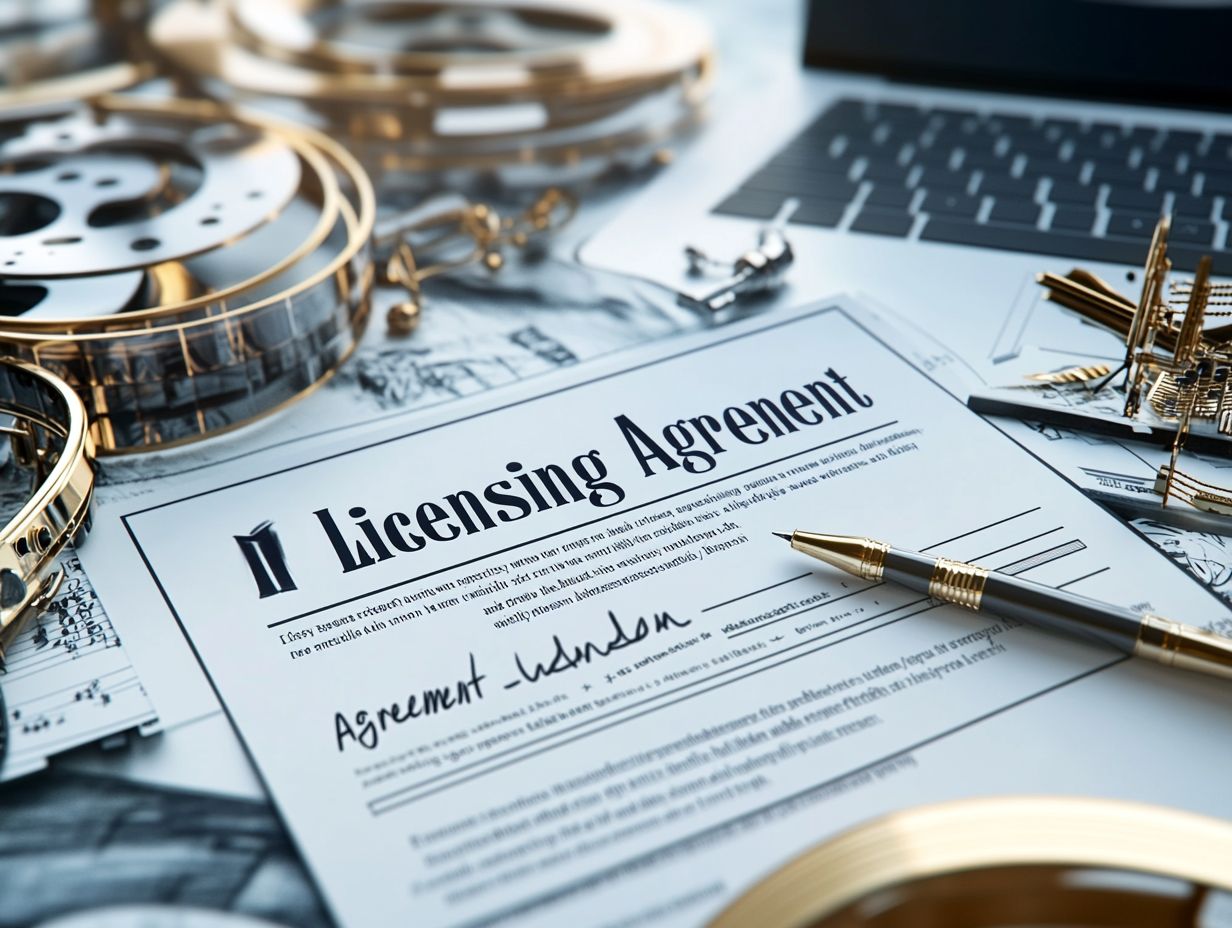Licensing Agreements in the Entertainment Industry
In the ever-evolving realm of the entertainment industry, licensing agreements are crucial for how creative works are shared and monetized. Understanding these agreements is essential for your success in the entertainment landscape. Don t miss out!
Whether you re dealing with a catchy jingle, a blockbuster film, or trendy merchandise, grasping the various types of licensing agreements such as merchandising, music, and film agreements is essential for both creators and businesses.
This article unpacks the key elements of these agreements, provides negotiation tips, highlights common pitfalls, and addresses the legal considerations for enforcing and terminating contracts. Jump in and get the knowledge you need to tackle this complex field with confidence!
Contents
- Key Takeaways:
- Definition and Purpose
- Types of Licensing Agreements
- Conclusion
- Key Elements of a Licensing Agreement
- Negotiating a Licensing Agreement
- Common Pitfalls to Avoid
- Enforcing and Terminating a Licensing Agreement
- Frequently Asked Questions
- What is a licensing agreement in the entertainment industry?
- Why are clear terms important in a licensing agreement?
- What should I consider before signing a licensing agreement?
- How can I protect my intellectual property in a licensing agreement?
- What is the purpose of a licensing agreement in the entertainment industry?
- What are the key components of a licensing agreement in the entertainment industry?
- What are some common types of licensing agreements in the entertainment industry?
- What are the benefits of entering into a licensing agreement in the entertainment industry?
- What are some potential drawbacks of licensing agreements in the entertainment industry?
Key Takeaways:

- Licensing agreements grant permission for using intellectual property.
- Types include merchandising, music, and film/TV agreements.
- Key negotiation points are rights, restrictions, and compensation.
Definition and Purpose
A licensing agreement serves as a legally binding contract between you, the licensee, and the licensor (the person or company that owns the intellectual property), granting you the right to utilize the licensor’s intellectual property under clearly defined terms and conditions. For insights on how these agreements are evolving, explore the future of licensing agreements in a digital world.
This arrangement can involve various forms of intellectual property, including trademarks, patents, and copyrights. It may also encompass rights related to media assets, software, and commercial licenses.
The essence of these agreements lies in allowing property owners to generate licensing revenues while enabling you to leverage a brand’s strength and recognition within specific geographical regions or industries.
Types of Licensing Agreements
You’ll find a range of licensing agreements tailored to various industries and specific needs. These include trademark licensing, merchandising agreements, and media rights agreements, each carefully designed to help licensors earn more while granting licensees the crucial rights to utilize certain intellectual properties, all within the framework of licensing agreements.
Merchandising Agreements
Merchandising agreements are contracts that grant you, as a licensee, the right to produce and sell products featuring a licensor’s trademark. This strategy allows you to leverage brand recognition to open additional revenue streams while ensuring trademark protection.
These agreements can cover a diverse range of products, from apparel and toys to home goods and collectibles, showcasing the versatility of brands across various markets. A collaboration between a popular film franchise and toy manufacturers highlights how successful licensing can yield substantial profits.
Royalties in these agreements can vary significantly, typically structured as a percentage of sales, which incentivizes you and the licensor to actively promote the products. The essential role of trademark protection guarantees that the licensor’s brand remains distinct and reputable in the eyes of consumers, solidifying trust and maintaining the brand’s value.
Music Licensing Agreements
Music licensing agreements are pivotal contracts that grant you, the licensee, the right to use a creator’s music across various media. Understanding the role of licensing agreements in mergers and acquisitions ensures that the royalties generated from the music’s use are fairly distributed among all parties involved.
You’ll encounter different types of agreements, each designed for specific applications, such as sync licenses (licenses that allow music to be used in films or shows) for films and television, or navigating licensing agreements in the tech sector for software and digital products.
By clearly outlining the terms of use and detailing distribution rights, these agreements are essential for navigating the intricate world of content dissemination across multiple platforms. Keep in mind that royalty rates can fluctuate significantly, influenced by factors such as the type of media and the stature of the music.
The rights management process, typically overseen by organizations like ASCAP or BMI, plays a crucial role in ensuring that creators receive equitable compensation whenever their music is utilized, upholding both legal and ethical standards.
Conclusion
Understanding licensing agreements is vital for both creators and businesses. By grasping the nuances of these contracts, including the legal implications of licensing agreements, you can navigate the entertainment industry effectively and ensure your interests are well-protected.
Film and Television Licensing Agreements

Film and television licensing agreements lay down the framework for how films or television shows can be distributed. Understanding these agreements is crucial, as they ensure that both licensors and licensees benefit from the financial opportunities generated through media rights and content monetization, making knowledge of licensing agreements in IP strategy essential.
These agreements often feature detailed rules about exclusivity. This allows a platform to secure rights for a specific region while potentially preventing other broadcasters from airing the same content in that territory.
For example, a deal struck between a major film studio and a streaming giant like Netflix could grant exclusive streaming rights in particular geographical areas. This bolsters the platform’s competitive advantage.
The negotiation process resembles a maze of discussions. Aspects such as the value of rights, duration of licensing, and the distribution format are carefully deliberated. These complexities impact the financial landscape and shape how audiences access content within the evolving media ecosystem.
Key Elements of a Licensing Agreement
A well-crafted licensing agreement includes essential elements that clearly outline the rights and restrictions, compensation models, and the dynamic between licensors and licensees. These components shape the success of the agreement, ensuring that both parties understand their obligations and expectations.
Rights and Restrictions
Rights and restrictions are crucial components of licensing agreements. They outline what you can and cannot do with the intellectual property, which impacts how you market your products and the geographical regions where you can sell them.
In these agreements, usage rights generally encompass media assets. This ensures that you can utilize photographs, logos, and video materials for designated purposes while protecting the integrity of the trademark.
Restrictions might include limitations on modifying these assets or using them in ways that could mislead consumers. Violating these terms can lead to serious legal implications, potentially resulting in claims of infringement and expensive litigation.
Understanding these elements is vital for your success to prevent disputes stemming from misunderstandings. Having a carefully crafted agreement is crucial to avoid pitfalls.
Compensation and Royalties
Compensation in licensing agreements primarily hinges on royalties. Royalties are payments made to the licensor based on the revenue generated from using their licensed intellectual property. Typically, these royalties are structured around specific rates.
These payments can fluctuate significantly due to various factors, including the exclusivity of the license, market demand, and the competitive landscape. Upfront fees might also be part of the arrangement, providing immediate income to the licensor. Ongoing revenue-sharing models can offer you a continuous stream based on sales, making the agreement more appealing for both sides.
The negotiation process for royalty rates often centers on perceived value, the bargaining power of each party, and anticipated profitability. All of these play a crucial role in determining the overall success and sustainability of the licensing arrangement.
Negotiating a Licensing Agreement
Negotiating a licensing agreement is an essential process. It involves setting terms that create mutual benefits for both the licensor and the licensee. This requires a thoughtful examination of the interests of all parties involved, ensuring that each stakeholder’s needs are carefully considered and addressed.
If you’re interested in learning more about licensing agreements or need assistance, consider consulting a professional.
Tips for Successful Negotiations

Prepare thoroughly to secure your success! To achieve successful negotiations in a licensing agreement, you must understand market dynamics and foster transparent communication between licensing partners. This creates a solid foundation for your contractual agreements.
Your preparation should involve researching industry standards and understanding the specific objectives and concerns of everyone involved. For instance, in technology licensing, your company might prioritize innovation and market reach. Meanwhile, your partner may focus on cost-effectiveness and protecting intellectual property.
Looking at successful negotiations in sectors like pharmaceuticals reveals that recognizing each party’s underlying aspirations can lead to mutually beneficial outcomes.
Establishing rapport through open dialogue is crucial. It allows both sides to express their needs, preventing misunderstandings that could derail the entire process.
Common Pitfalls to Avoid
When negotiating licensing agreements, be aware of common pitfalls that can jeopardize your arrangement’s success.
Overlooking critical legal implications or failing to define the rights and restrictions in the agreement can lead to significant challenges later.
By staying vigilant and thorough, you can safeguard your interests and ensure a more favorable outcome.
Mistakes to Watch Out For
Mistakes in licensing agreements can lead to serious legal battles and financial losses, often due to unclear terms or incorrect payment calculations.
These oversights can spark disputes that deplete your resources and strain essential business relationships. For example, failing to define the scope of use can lead to unauthorized use, resulting in hefty penalties and litigation costs.
Improper royalty structures can create significant revenue shortfalls for you as the licensor, potentially destabilizing your business model.
Engaging with the right legal counsel early on offers invaluable insights, ensuring clarity in your agreements and uncovering potential pitfalls before they escalate into costly issues.
Enforcing and Terminating a Licensing Agreement
Understanding enforcement and termination clauses within a licensing agreement is essential.
These legal elements determine how the agreement is maintained and the conditions under which either party may choose to terminate it.
Legal Considerations
Legal considerations surrounding licensing agreements involve various important factors, including your ability to enforce the terms and manage any infringement issues that may arise.
A solid legal framework underpins these agreements, with laws and regulations protecting you as a licensor and your licensee.
Intellectual property laws, such as copyright and trademark regulations, form the foundation of licensing negotiations. By incorporating well-defined terms regarding usage rights, you protect your interests while allowing licensors to retain control over their creations.
Establishing clear dispute resolution mechanisms enables you to respond promptly to potential infringements, ensuring that issues are addressed efficiently. This fosters a more secure and harmonious business relationship.
Frequently Asked Questions

What is a licensing agreement in the entertainment industry?
A licensing agreement in the entertainment industry is a legally binding contract between two parties. One party, the licensor, grants the other party, the licensee, the right to use their intellectual property such as music, movies, or characters for a specific purpose and period of time. For a deeper dive, check out understanding trademark licensing agreements.
Why are clear terms important in a licensing agreement?
Clear terms are crucial as they define rights and obligations, reducing the risk of disputes and misunderstandings.
What should I consider before signing a licensing agreement?
Consider the scope of use, financial terms, and any potential legal issues that may arise. Consulting a legal expert can provide additional clarity.
How can I protect my intellectual property in a licensing agreement?
Include specific usage rights and limitations in the agreement and establish clear enforcement mechanisms to address any infringements promptly.
What is the purpose of a licensing agreement in the entertainment industry?
A licensing agreement allows a creator to profit from their intellectual property. They grant the user rights to use it in exchange for a fee or royalty.
What are the key components of a licensing agreement in the entertainment industry?
The key components include:
- A description of the intellectual property being licensed.
- The rights granted to the user.
- The duration of the agreement.
- Any exclusivity or territory restrictions.
- Financial terms.
- Provisions for termination or renewal.
What are some common types of licensing agreements in the entertainment industry?
Common types of licensing agreements include:
- Music licensing for film and television.
- Merchandise licensing for characters or brands.
- Video game licensing for the use of copyrighted material.
What are the benefits of entering into a licensing agreement in the entertainment industry?
For the creator, a licensing agreement can generate extra income. It can also help reach a larger audience and increase brand exposure.
The benefits also include access to popular content and the potential for increased profits and brand recognition.
What are some potential drawbacks of licensing agreements in the entertainment industry?
Beware! Licensing fees can eat into profits. It s crucial to understand these costs upfront.
Additionally, there may be restrictions on how the intellectual property can be used, and the agreement could be terminated if certain conditions are not met.






